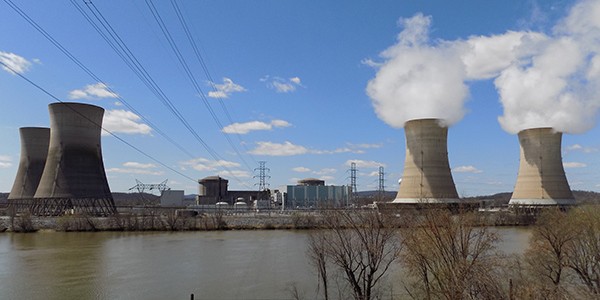By Christen Smith
Three Mile Island’s fate looks bleaker by the day as Pennsylvania lawmakers on Monday wrapped up a series of hearings that considered subsidizing the state’s nuclear fleet, with some concluding even legislative intervention won’t save the infamous facility.
House Consumer Affairs Committee Chairman Brad Roae (R) said consideration of House Bill 11 will weigh a complex mix of impacts on the state’s economy, energy prices and environmental goals but will likely not make enough difference to prevent TMI from closing in September.
“Even if we did do this, it doesn’t seem like TMI is economically viable,” he said while concluding the committee’s fourth public hearing on the issue. “If we did do this, it would close. If we don’t do this, it would close.”
Exelon-owned TMI contains one of the state’s nine nuclear reactors and will begin the months-long deactivation process on June 1 amid dwindling profits as cheaper fossil fuels set prices in the wholesale electricity market.
“If these facilities are lost, they will be replaced primarily by natural gas-fired generators — not wind and solar,” said Kathleen Barron, Exelon’s senior vice president of government and regulatory affairs, in submitted testimony. “Carbon and other harmful emissions will increase. Grid resilience will deteriorate. And costs to consumers will go up.”
One way to fix this, some state lawmakers believe, is to incorporate nuclear power into the state’s Alternative Energy Portfolio Standard (AEPS) program. The AEPS provides tax credits for renewable resources spread across two tiers from which electric distributors must buy 18% of their power by 2021, though recent proposals in both the House and Senate want to push this goal to 30% by 2030. (See Pennsylvania Democrats Back Renewables Subsidy Expansion.)
HB 11 — and the similar Senate Bill 510 — would create a third tier in the AEPS from which suppliers must buy an additional 50% of their power by 2021. (See Pa. Lawmakers Unveil $500M Nuke Subsidy Bill.) The new credits would cost ratepayers as much as $550 million each year, making it larger than any other subsidy program nationwide.
Both Exelon and FirstEnergy said HB 11 levels the playing field against polluting fossil fuel plants and appropriately values the carbon-free, reliable power reactors provide 24/7, 365 days a year. FirstEnergy will likely retire its Beaver Valley reactors in 2021 as the company wades through Chapter 11 bankruptcy proceedings. (See Judge Rejects Liability Release in FirstEnergy Reorg.)
PJM’s Independent Market Monitor said in March three of the RTO’s 18 nuclear facilities face revenue shortfalls through 2021. The three plants — Davis-Besse, Perry (both in Ohio) and TMI — each operate just one reactor. The remaining multi-unit facilities, including the subsidized Quad Cities in Illinois, will remain profitable. Even without ZECs, Quad Cities would cover its costs for the next three years, according to the Monitor. (See Monitor Says PJM’s Capacity Market not Competitive.)
Barron has said the Monitor’s prior estimates of profits and losses across Exelon’s three Pennsylvania plants were based on “inaccurate” data. The Monitor previously concluded TMI lost $37 million in 2018, while the Peach Bottom and Limerick plants earned a combined $350 million. (See Nuke Talks Continue in Pa. Assembly.)
Paul Adams, an Exelon spokesperson, clarified on Monday that TMI will remain open if HB 11 passes before June 1. “Absent passage by June 1, TMI will shut down in September,” he said.
Market Impact
Stu Bresler, PJM’s senior vice president of operations and markets, told the committee the grid operator takes no position on either of the bills pending before lawmakers.
“That PJM is neither advocate nor opponent of HB 11 should not, however, be taken as an indication the bill lacks potential impact or consequence to our markets under their current format and structure,” he said, citing a FERC ruling that determined out-of-market nuclear subsidies were distorting PJM’s capacity market.
Bresler also pushed back against the oversimplification of PJM markets that some testifiers have said values the cheapest price for the next five minutes. He noted the RTO manages multiple markets that balance its resource mix and maintain reliability — not just for the next five minutes but for as many as 15 years in the future.
“It is true that PJM’s markets do not inherently value carbon-free generation,” he said, noting “externalities” like carbon emission are not valued in markets without corresponding state policy setting a price. “The omission of such an externality is by no means unique to PJM’s markets. PJM’s markets can, however, be leveraged to bring the benefits and discipline of competition to a state’s carbon mitigation policy goals, but it requires that state to authorize a cost to be assigned to those carbon emissions.”




